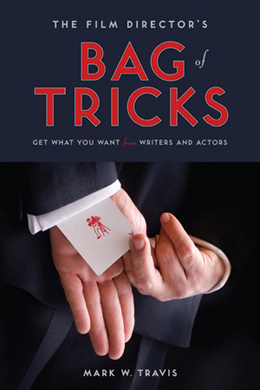
Watch the video on Youtube here
Film Courage: Mark, I believe you’ve said previously that every director must also be a writer. So does that mean that every director should rewrite (in some sense) the screenplay of the movie that they are directing?
Mark W. Travis: Oh…what a great question. But there are two questions. You always hit me with two questions [laughs]. First of all, every director…I’m going to do every director should be a writer. Yes! Every director should write. Whether they write well or not is not important. I think every director should understand the writing process. That’s why we do Write Your Life. But also the screenwriting process which is different and to understand and appreciate the challenges I’m trying to get a story into what I call the 2-Hour Haiku. You know, it’s like reducing it down to…well, we can talk about that later.
“Rewriting a script? It’s not the director’s job to rewrite. It is the director’s job to work with a writer. I’m a very passionate protector of the writer and I think if the writer has brought a script to a point where a director is interested in doing it, then they should keep working with the writer.”
But in terms of the director rewriting. No! Rewriting a script? It’s not the director’s job to rewrite. It is the director’s job to work with a writer. I’m a very passionate protector of the writer and I think if the writer has brought a script to a point where a director is interested in doing it, then they should keep working with the writer. I don’t understand this getting rid of writers or bringing in other people to rewrite.
I do understand the collaboration of a director and writer working and then eventually with the actors and everybody else staying involved. When I’ve done films the writer stays all the way through the making of the film, all the way through production and post-production. They are part of the storytelling team. I have my job. They have their job. I like having the writer on the set. I’m shooting something…there was one film I was doing which we we’re having trouble with the a scene. I remember this…the two writers were there…it was a writing team. And we couldn’t get it to work and I told them…I said “I am going to improvise the scene. Hold on.” And they went “Okay.” And I went back to the actors and I took them through a quick process and then we started to improvise the scene and I remember the writer going “Yes! You’ve got it!”
No. The fact that the writers said “Yes! That’s where we’re going,” I felt great. It wasn’t me rewriting the scene. It wasn’t even the actors rewriting the scene. The writers were there. I’m trying to serve their initial vision of the film, combined with mine, combined with the actors trying to reach the characters. So I don’t like the idea (although it happens a lot in Europe, which you may know) and I’ve run it by a lot of friends because I teach a lot in Europe (especially in Germany). And a lot of friends who are very, very successful writers there and it’s a constant problem. They will write a script (say for television) and a director comes on and the director does a rewrite. The first thing they do is rewrite it.

Watch the video interview on Youtube here
I directed a little bit in Germany and at one point was going to direct something and the production company sent me the script and said “When are we going to get your director’s script?” and I said “What do you mean?” I’m reading the script and am saying “Yes, I want to do this. What do you mean the director’s script? What they meant was: we expect you to rewrite it. So this was the producers expecting the director to rewrite the script that they had bought and they wanted to produce. And I said “No. I am not going to rewrite it. I’m going to work with a writer.”
So I don’t encourage directors to think they have to rewrite it. I’ve seen too many times (especially in Europe) directors rewriting and reworking a script and it was really clear what they were doing, unconsciously (I think) or maybe consciously. They were creating a script that they knew how to direct. And by doing that they reduced it or shifted it from the initial intention rather than trying to serve the script that was there initially, they altered it to something that they could handle.
Film Courage: And then the story lost its essence because…
Mark W. Travis: Lost this one very important project which a friend of mine had written and she had a powerful script and it was changed so dramatically into the style of film that the director felt comfortable in doing. He had been hired to do a film that he wasn’t really comfortable with, so he changed into something…and it changed totally. It lost (to me) the essence of what was there originally. It turned out fine in the end but it was a whole different story. It wasn’t what was there originally.
Question for the Viewers: What are your thoughts on a director rewriting a script?
See all of Mark W. Travis Film Courage interviews here on Youtube

CONNECT WITH MARK W. TRAVIS
Markwtravis.com
Facebook.com/markwtravistechnique
@MarkWTravis

MARK W. TRAVIS is regarded by Hollywood and independent film professionals internationally as the world’s leading teacher and consultant on the art and craft of film directing. He is known as “the director’s director.”
Fueled by the desire to generate organic and authentic performances in an instant, Mark developed his revolutionary Travis Technique™ over a span of 40 years. Not limited to filmmakers, The Travis Technique™ has proven to be an essential set of tools for all storytellers, writers, directors and actors.
Mark Travis has taught at many internationally acclaimed film schools and institutions, including Pixar University, American Film Institute, UCLA Film School, FAS Screen Training Ireland, NISS – Nordisk Institutt for Scene og Studio (Norway), Odessa International Film Festival (Ukraine), CILECT – The International Association of Film and Television Schools, and the Asia Pacific Screen Lab (hosted by Griffith University Film School, Brisbane, Australia).
Productions directed by Mark W. Travis have garnered over 30 major awards, including: an Emmy, Drama-Logue, L.A. Weekly, Drama Critics’ Circle, A.D.A, and Ovation awards.
His film and television directing credits include: The Facts of Life, Family Ties, Capitol, Hillers, and the Emmy Award-winning PBS dramatic special, Blind Tom: The Thomas Bethune Story. Also the feature films Going Under (for Warner Bros. starring Bill Pullman and Ned Beatty), Earlet (documentary), The Baritones, and The 636.
On-stage, over the past 20 years, Mark has directed over 60 theatre productions in Los Angeles and New York, including: A Bronx Tale, Verdigris, The Lion in Winter, Mornings At Seven, Equus, Café 50s, And A Nightingale Sang, Wings, Linke vs. Redfield, The Coming of Stork and others.
Mark is the author of the Number-One Best Seller (L.A. Times), THE DIRECTOR’S JOURNEY: the Creative Collaboration between Directors, Writers and Actors. His second book on directing,
DIRECTING FEATURE FILMS (published in April of 2002) is currently used as required text in film schools worldwide. His third book, THE FILM DIRECTOR’S BAG OF TRICKS: Get What You Want from Writers and Actors was published in 2011. Mark’s popular DVD, HOLLYWOOD FILM DIRECTING, is available now.
MARK TRAVIS and ELSHA BOHNERT offer workshops and consultations on all aspects of storytelling for writers, directors and actors.
Advertisement

Watch Cold Love on Vimeo here
COLD LOVE – Cold Love highlights three expeditions spanning many years of Lonnie Dupre’s career — the first non-motorized circumnavigation of Greenland, the first summer expedition to the North Pole, and the first attempt of a solo January ascent of Denali. The film’s powerful footage reveals up-close the beauty and life-giving forces of these icy realms. And in seeing, we can’t help but be inspired to love and protect our earth’s frozen places. Not only are they beautiful and fragile, but they are the global engine that regulates the climate and provides a stable environment for all life on the planet.

See the late Alan Thicke in It’s Not My Fault and I Don’t Care Anyway on iTunes here
IT’S NOT MY FAULT AND I DON’T CARE ANYWAY – A rich and famous self-help guru’s controversial philosophy of extreme selfishness is put to the ultimate test when his only daughter is kidnapped and held for ransom (featuring the late Alan Thicke)

Watch Valley of Ditches on Vimeo here
VALLEY OF DITCHES – A young woman bound in the front seat of a parked car watches helpless as her captor methodically digs a grave in the desert ground. The bloody lifeless body of her boyfriend lies framed in the rear-view mirror, a fate she will fight at all costs to avoid for herself. But this is only the beginning of a brutal struggle where survival could be worse than death.

The Film Fund – check it out here!
From The Film Fund – Get up to $10,000 to make your short film by writing one sentence. The Film Fund is providing funding up to $10,000 for a short film in a way that’s a lot simpler than screenwriting contests, crowdfunding, or applying to grants – read more about Founder and CEO Thomas Verdi’s The Film Fund here via his website.

Visit LeftOnPurpose.com here to watch the film and read more on Mayer Vishner
LEFT ON PURPOSE – Midway through the filming of a documentary about his life as an anti war activist, Mayer Vishner declares that his time has passed and that his last political act will be to commit suicide— and he wants it all on camera. Now the director must decide whether to turn off his camera or use it to keep his friend alive. Left on Purpose is an award winning feature length documentary that confronts the growing issues of aging, isolation and end of life choices through an intense character driven story of the relationship between filmmaker and subject. With humor and heart it provides a rare cinematic look at what it means to be a friend to someone in pain.
























